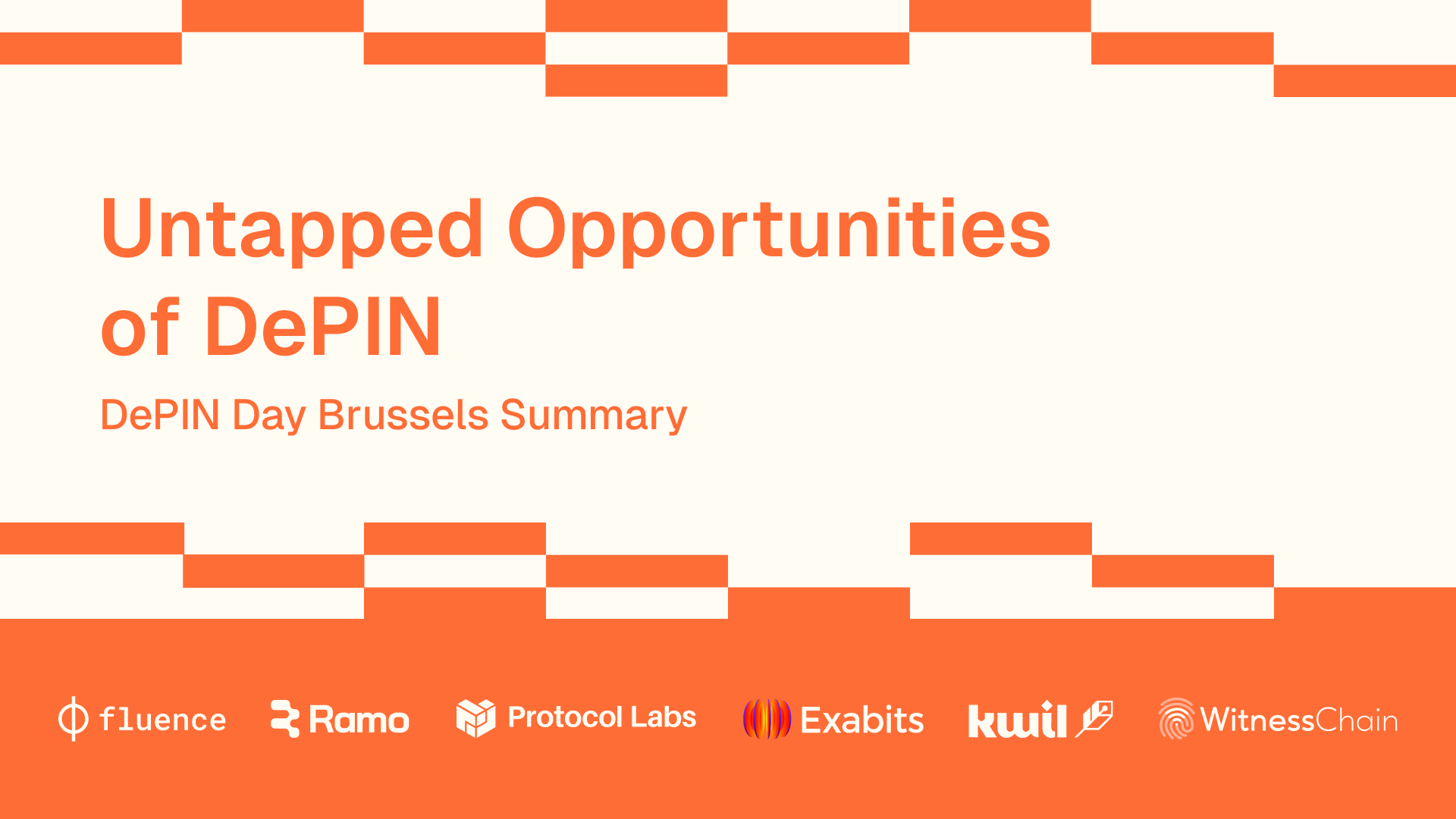Untapped Opportunities of DePIN ~ DePIN Day Brussels @ ETH CC Summary

As most of you already know, Fluence team together with various partners and collaborators have been hosting DePIN Days - inviting leaders, researchers, developers, and enthusiasts of decentralised physical infrastructure to mingle and discuss recent developments and future prospects of the ecosystem. The last edition took place during ETH CC in Brussels. Read on to learn key insights from the discussion panels from that day. To access all talks, visit our YouTube channel.
📌 Breaking Into Mainstream - DePINs Certain Future?
In this fireside panel discussion, Anna Bertha from DCG, Jasper De Maere from Outlier Ventures, Alpen Sheth from Borderless Capital, and Mahesh Ramakrishnan from Escape Velocity, with the session moderated by Rob Schmults from Blockchange. The discussion focused on what venture capitalists look for when selecting companies to invest in or join their portfolio companies in the DePIN ecosystem.
They highlighted the importance of projects' cultivating a community that can evangelize and market products, the use of intent infrastructure that already exists, and founders having domain knowledge about their specific market - as key metrics to check before investment. Furthermore, having a good business model with an area of focus and tech stacks are identifiable metrics panelists look at when selecting companies to join their portfolios.
The discussion also covered issues like the key components of tokenomics of DePIN projects. This includes running oracle and node sales to raise initial capital, kickstarting the network and figuring out how tokens represent ownership. Treating financial operations as a secondary layer was discouraged, as well as making incentives which are too short-term based.
Watch the fireside chat here
📌 Untapped Opportunities of DePIN & AI
The following panel featured Harry Grieve (Gensyn), Anil Murty (Akash), David Sneider (Lit Protocol), and Lukas Bresser (Ramo), who sat to discuss the untapped opportunities of decentralized AI within the DePIN ecosystem.
There has not been another revolutionary technology, that promises as significant improvements to humanity as artificial intelligence. If AI were to remain a closed system to the economic improvement and its impact would be limited. AI should also be decentralized to allow for dynamic pricing and, economic incentivization and scalability to ensure efficient compute and progress to create cryptographic rights and value.
The projects represented by our panelists contribute to the future of decentralised AI in various ways. Computation is solved at Gensys where machine learning engineers train large neural networks across heterogenous trusted devices in a way which is highly scalable and low cost. Lit Protocol is a distributed key management and blind execution network and is used today to encrypt data and store it on open web systems like Arweave, IPFS. Akash is a decentralized cloud provider that empowers AI companies run open source AI models easily and low cost compared to GCP and AWS.
AI is definitely the hype today and the hype for DePIN is driven by pure scarcity of the compute for AI. This huge demand leads to competition and the value proposition of DePIN enabling startup companies innovate in AI.
Watch the panel discussion here
📌 Democratising Infrastructure with DePIN
Over the past few years DePIN has become a huge part of the decentralized web, powering a wide range of potential use cases.
The last, but not certainly not least panel discussion, titled Democratizing Infrastructure with DePIN, featuring technologists and experts including Clemens Wan (Consensys / Infura / DIN), Simone Romano (IoTeX) Paksy Plackis-Cheng (Staex), Ranvir Rana (Witness Chain) and was moderated by Megan Klimen (Filecoin Foundarion).
We begun with the question on thoughts on the pressing issues with the global data infrastructure today and the need for DePIN. The answer is obvious we have seen the blockchain technology to achieve great success in the last year and the most natural implementation of blockchain is at the incentive layer. Physical infrastructure is where you need reliability, democracy and censorship resistant said - Simone Romano. Ranvir Rana from Witness Chain emphasized the fact that DePIN by nature is decentralized, however it has been developed with centralized economics and it is very expensive to deploy. DePIN provides a way for the economics in which infrastructure networks develop by pushing capital to the edge. This enables cost reduction and new type of infrastructure to be setup.
Later the conversation shifted to the fact that this infrastructure faces high barrier for entry and the need for projects to actually decentralize their incentive mechanism, and advised builders to study projects like Filecoin and Fluence. Metrics for AI and DePIN ecosystem in 2024 is that big tech cooperations will embrace decentralization and its structures to become actors in the space.
Watch the full panel discussion here.
Don't miss the future editions of DePIN Day - follow us on Twitter to stay in touch.

